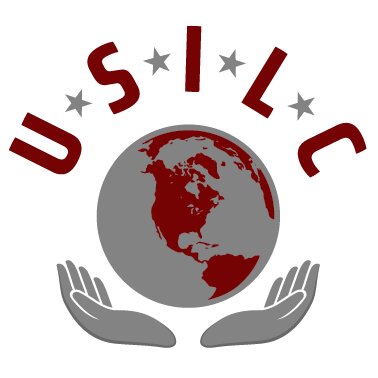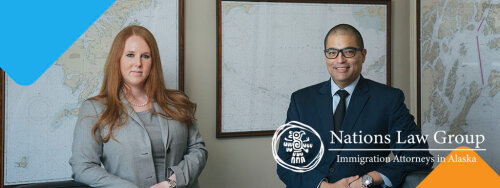Best Citizenship Lawyers in Alaska
Share your needs with us, get contacted by law firms.
Free. Takes 2 min.
Or refine your search by selecting a city:
List of the best lawyers in Alaska, United States
About Citizenship Law in Alaska, United States
Citizenship law in Alaska, United States, is guided primarily by federal regulations, as citizenship is determined at the national level. However, residents of Alaska may face unique circumstances due to the state’s geography, indigenous populations, and proximity to international borders. Individuals seeking citizenship must comply with federal requirements set by United States Citizenship and Immigration Services (USCIS), but estate-specific services and support are often available to help navigate the process. Understanding these laws can help residents achieve or clarify their citizenship status, assert their rights, and access public benefits and services.
Why You May Need a Lawyer
Citizenship matters can be complex and highly consequential. People often need legal assistance in citizenship cases for several reasons. You may need a lawyer if you are:
- Applying for naturalization and unsure about eligibility or required documentation
- Facing complications due to criminal history or previous immigration violations
- Requiring help with understanding your rights as an American Indian or Alaska Native
- Dealing with a denial of a citizenship application or notice to appear in immigration court
- Involved in cases related to derivative or acquired citizenship for children born abroad or to Alaska Natives
- Needing clarification on dual citizenship rules
- Worried about deportation or removal proceedings
- Having questions about the requirements for citizenship documentation, including passports and certificates of citizenship
- Sponsoring family members for citizenship or permanent residence
- Needing help understanding state and local benefits available to citizens and noncitizens
A knowledgeable attorney can help clarify your situation, identify your legal options, and represent your best interests.
Local Laws Overview
Although citizenship eligibility is controlled by federal laws, Alaska's legal landscape offers particular considerations for residents, especially Alaska Natives, refugees, and immigrants living in remote areas.
- Services for Alaska Natives: Specific programs are in place to assist American Indians and Alaska Natives regarding nationality and benefits access.
- Remote Access: Many Alaskan communities are far from major government offices, meaning additional logistical challenges in scheduling interviews, submitting biometrics, or attending hearings.
- Language Assistance: Alaska provides programs to help with interpretation services for those whose first language is not English.
- State Benefits: Alaska law permits certain state benefits for lawful permanent residents, refugees, and naturalized citizens, in accordance with federal and state guidelines.
- International Border Proximity: Due to Alaska’s closeness to Russia and Canada, unique issues may arise with cross-border travel, mixed-nationality families, or historical claims to citizenship.
Being familiar with these local considerations is crucial for a successful citizenship process in Alaska.
Frequently Asked Questions
What are the main requirements to become a United States citizen in Alaska?
You must satisfy federal eligibility criteria: lawful permanent residency for at least five years (or three years for spouses of citizens), continuous residence, physical presence, basic English proficiency, knowledge of U.S. government and history, and good moral character.
Where do I file my citizenship application if I live in Alaska?
All applications are handled by United States Citizenship and Immigration Services (USCIS). Some paperwork may be submitted online, while biometrics and interviews are coordinated primarily through the Anchorage USCIS office.
Are there special rules for Alaska Natives regarding citizenship?
Anyone born in the United States, including Alaska, is a citizen by birth. Some Alaska Natives may have unique documentation needs or may qualify for special programs due to tribal affiliations, but the core rules of citizenship are the same.
What should I do if my citizenship application is denied?
You have the right to appeal. A lawyer can help you review the reasons for denial, prepare an appeal, or refile with new documentation as needed.
Can I hold dual citizenship as an Alaskan?
U.S. law permits dual citizenship, but not all countries do. Alaska residents can generally hold U.S. and foreign citizenship, but it is important to verify this with the other involved nation.
Is there support for non-English speakers in Alaska during the citizenship process?
Yes, interpretation and translation services are available through various local agencies to help with forms, interviews, and tests.
What documents do I need to submit with my naturalization application?
Typically, you need your green card, identification, proof of residency, and supporting documents for exemptions or special circumstances. Requirements may vary based on your individual situation.
How long does the citizenship process take in Alaska?
Processing times can range from six months to over a year, depending on USCIS workload, the complexity of your case, and the availability of local appointments.
Are there resources specifically for refugees or asylees in Alaska?
Yes, organizations like Catholic Social Services and local resettlement agencies offer legal help, counseling, and community support for refugees and asylees.
Can I get help with my citizenship test preparation in Alaska?
Community organizations, libraries, and adult education centers often offer citizenship test preparation courses and study materials for Alaska residents.
Additional Resources
If you need more information or direct assistance, consider reaching out to these resources:
- United States Citizenship and Immigration Services (USCIS) - Anchorage Field Office
- Alaska Institute for Justice - Provides legal services for immigrants and refugees
- Catholic Social Services Refugee Assistance & Immigration Services (RAIS)
- Alaska Native Justice Center
- Local Legal Aid Societies
- Alaska Bar Association - Lawyer Referral Service
- Local public libraries and adult education centers for citizenship and English resources
- Community-based organizations serving immigrant populations
Next Steps
If you are seeking legal help with citizenship in Alaska, the best course of action is to gather all relevant personal documentation, write down your questions or concerns, and reach out to a qualified immigration attorney or legal aid organization. Start by contacting local legal aid, using a reputable lawyer referral service, or reaching out to community-based organizations focused on immigration assistance. It is important to act promptly, especially if you are facing a deadline or any complications. A legal professional can clarify your options, guide your application, and represent you in interactions with government agencies to help you achieve your citizenship goals.
Lawzana helps you find the best lawyers and law firms in Alaska through a curated and pre-screened list of qualified legal professionals. Our platform offers rankings and detailed profiles of attorneys and law firms, allowing you to compare based on practice areas, including Citizenship, experience, and client feedback.
Each profile includes a description of the firm's areas of practice, client reviews, team members and partners, year of establishment, spoken languages, office locations, contact information, social media presence, and any published articles or resources. Most firms on our platform speak English and are experienced in both local and international legal matters.
Get a quote from top-rated law firms in Alaska, United States — quickly, securely, and without unnecessary hassle.
Disclaimer:
The information provided on this page is for general informational purposes only and does not constitute legal advice. While we strive to ensure the accuracy and relevance of the content, legal information may change over time, and interpretations of the law can vary. You should always consult with a qualified legal professional for advice specific to your situation.
We disclaim all liability for actions taken or not taken based on the content of this page. If you believe any information is incorrect or outdated, please contact us, and we will review and update it where appropriate.
Browse citizenship law firms by city in Alaska
Refine your search by selecting a city.












